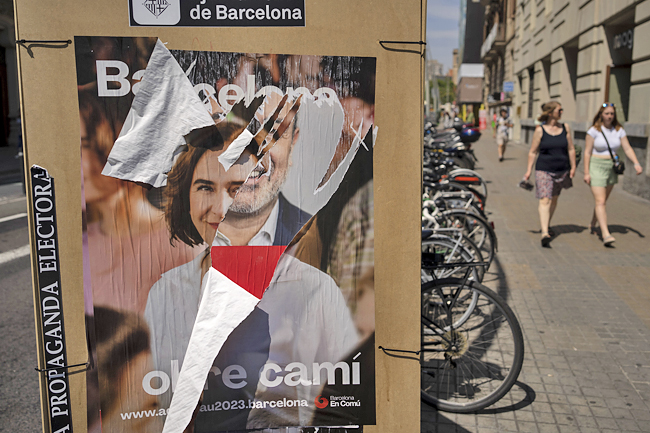MADRID (AP) – Spain goes to the polls tomorrow for local and regional elections seen as a bellwether for a national vote in December, with the conservative Popular Party steadily gaining ground on the ruling Socialists in key regions.
Spain’s 17 regional governments, plus two autonomous cities, have enormous power and budgetary discretion over education, health, housing and policing. Twelve of them and the two cities will be contested tomorrow. Other key battles include the selection of mayors for the country’s two largest cities, Madrid and Barcelona.
Polls released on Monday by Spain’s CIS public research institute showed the Spanish Socialist Workers Party, or PSOE, is just 0.3 percentage points ahead of the Popular Party in the regional vote, compared with the 5.14-point gap the party achieved in the last regional election in 2019. Researchers surveyed 4,549 adults across Spain between May 16-18 with a 1.5-point margin of error.
Politics professor Sandra León said the PSOE-led central government is struggling to persuade voters of its economic prowess, despite record figures for new jobs and policies that mean Spain has some of Europe’s lowest inflation and energy prices. The Popular Party, or PP, is also hoovering up centrist votes from the fading Citizens party and trying to curry favour with disillusioned far-right voters, she added.
“Although these are regional and local elections, the implications for national elections of the current electoral campaign are massive,” said León, who works at Madrid’s Carlos III University. “The Popular Party is gaining more leverage.”
The electoral campaign has been marred by isolated episodes of attempted postal vote fraud in the cities of Melilla and Mojacar, as well as a decision by the Basque nationalist party EH Bildu to put forward candidates convicted of terrorism and murder for election.
EH Bildu later retracted the decision following a public outcry against the inclusion of seven members of the former Basque militant group ETA.
This caused a headache for PSOE, which has relied on EH Bildu cooperation to pass legislation in support of its minority coalition with the far-left United We Can.
In Madrid, the hugely popular Isabel Díaz Ayuso is seeking re-election for a third time as regional president on a populist, libertarian platform that frames her as a direct opponent of Spain’s Prime Minister Pedro Sánchez.



